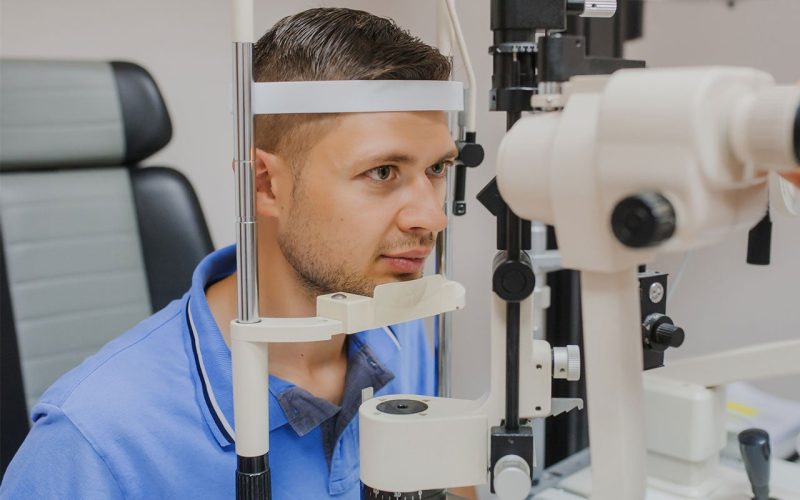Up to 90 percent of patients with moderate-to-severe atopic dermatitis (AD) or eczema appear to have ocular surface disease (OSD), that is accompanied by fewer conjunctival goblet cells compared to healthy controls. During dupilumab treatment, for which dupilumab-associated ocular surface disease (DAOSD) is the most commonly reported side effect, the function of these goblet cells decreased. In her PhD thesis, Roselie Achten (UMC Utrecht) concludes that it is important to follow a multidisciplinary approach to such ocular abnormalities involving both dermatologists and ophthalmologists for an early diagnosis and treatment of (DA)OSD.
Lees artikel in het Nederlands >
Atopic dermatitis or eczema is a chronic skin disease that affects up to 10 percent of adults and 15 percent of children. AD patients often have also other atopic comorbidities such as asthma, allergic rhinitis or food allergy. In addition, ocular surface disease (OSD), which can be used as an umbrella term for various eye diseases such as conjunctivitis and blepharitis, is very common in moderate-to-severe AD patients. Dupilumab, a fully human monoclonal antibody that blocks the IL-4 and IL-13 pathways, is the first antibody-based treatment that has been approved for moderate-to-severe AD. The most commonly reported side effect of dupilumab in AD patients is dupilumab-associated ocular surface disease (DAOSD). Therefore, a better understanding of OSD in AD patients with or without dupilumab treatment is urgently needed. The research in the PhD thesis by Roselie Achten (Department of Dermatology & Allergology, UMC Utrecht) aimed to (1) further identify the clinical and ophthalmological characteristics of OSD and its pathomechanism in moderate-to-severe AD, (2) clarify the clinical and ophthalmic characteristics of DAOSD, investigate risk factors for its development, and learn more about DAOSD management and its long-term follow-up, and (3) to describe the pathomechanism of OSD during dupilumab treatment in moderate-to-severe AD.
In one of her studies, the clinical characteristics, risk factors and pathomechanism of OSD were investigated. It was found that 90 percent of patients with moderate-to-severe AD already had OSD prior to dupilumab treatment, and that these patients had fewer conjunctival goblet cells compared with healthy controls. Also, Achten and colleagues found higher biomarker levels related to the severity of AD in the tear fluid of patients with moderate-to-severe OSD compared to patients with no or mild OSD.
During dupilumab treatment, the function of these goblet cells decreased. Eyelid eczema appeared to be associated with developing OSD both before and during dupilumab treatment. Also, the researchers found that dupilumab reached the eye, as dupilumab was detectable in the tear fluid of dupilumab-treated AD patients. Examination of patients’ tear fluid showed that patients with more severe OSD during dupilumab treatment had higher dupilumab tear fluid levels. Early treatment or adjustment of the dupilumab dosing interval may help improve these ocular abnormalities.
Roselie Achten concluded that it is important to follow a multidisciplinary approach to such ocular abnormalities involving both dermatologists and ophthalmologists for an early diagnosis and treatment of (DA)OSD.
Atopic dermatitis is one of the most common chronic inflammatory skin diseases worldwide. AD is characterized by itchy, red, swollen and ‘cracked’ skin, resulting in persistent pruritus, pain, sleep disturbances and symptoms of anxiety and depression. This may lead to a profound impairment of quality of life. According to the National Institute of Public Health and the Environment (RIVM), nearly 400,000 people in the Netherlands have AD with an estimated health care cost of €150 million per year.
Roselie Achten (1994, Nijmegen) defended her PhD thesis on November 14, 2023 at Utrecht University. The title of her thesis was “Ocular surface disease in atopic dermatitis and the effect of dupilumab treatment – Clinical characteristics, risk factors, and pathomechanism.” Supervisors were prof. Marjolein de Bruin-Weller MD PhD (Department of Dermatology & Allergology, UMC Utrecht) and prof. Joke de Boer MD PhD (Department of Ophthalmology, UMC Utrecht). Co-supervisors were Marlies de Graaf MD PhD (Department of Dermatology & Allergology, UMC Utrecht) and Judith Thijs MD PhD (Meander Medisch Centrum, Amersfoort). In April 2023, Roselie started her training to become a dermatologist at UMC Utrecht.

